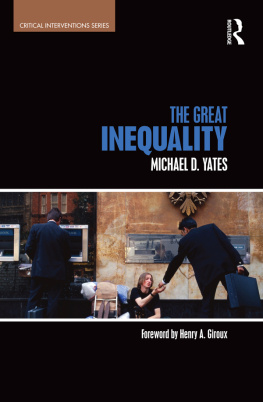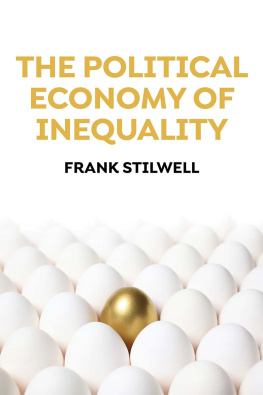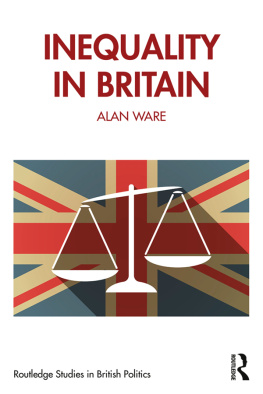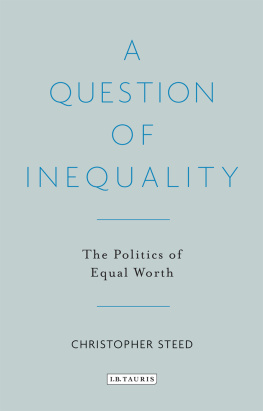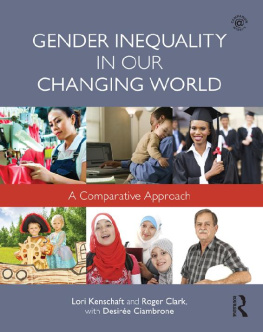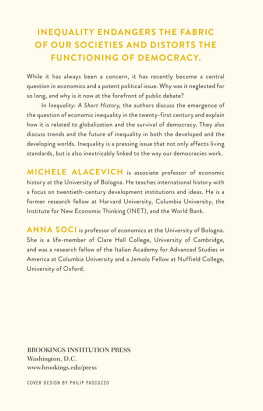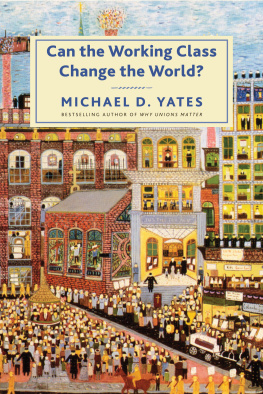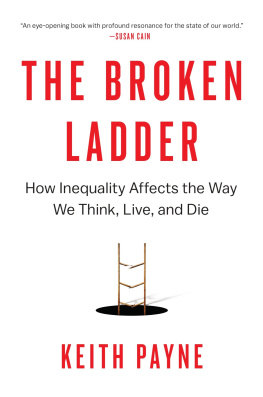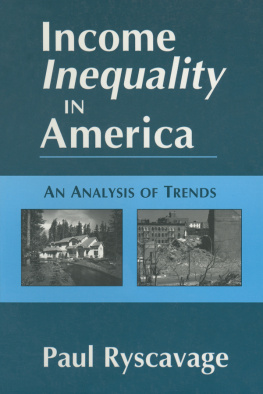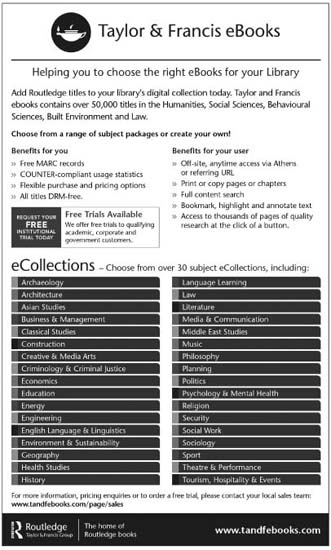First published 2016
by Routledge
711 Third Avenue, New York, NY 10017
and by Routledge
2 Park Square, Milton Park, Abingdon, Oxon, OX14 4RN
Routledge is an imprint of the Taylor & Francis Group, an informa business
2016 Taylor & Francis
The right of Michael D. Yates to be identified as author of this work has been asserted by him in accordance with sections 77 and 78 of the Copyright, Designs and Patents Act 1988.
All rights reserved. No part of this book may be reprinted or
reproduced or utilised in any form or by any electronic, mechanical,
or other means, now known or hereafter invented, including photocopying and recording, or in any information storage or retrieval system,
without permission in writing from the publishers.
Trademark notice: Product or corporate names may be trademarks or registered trademarks, and are used only for identification
and explanation without intent to infringe.
Library of Congress Cataloging in Publication Data
Yates, Michael, 1946 author.
The great inequality/Michael D. Yates.
pages cm.(Critical interventions)
1. Income distributionUnited States. 2. EqualityUnited States.
3. WealthUnited States. 4. Social classesUnited States. 5. United
StatesEconomic conditions21st century. 6. United StatesSocial
conditions21st century. I. Title.
HC110.I5Y37 2016
339.220973dc23
2015029598
ISBN: 978-1-138-18344-5 (hbk)
ISBN: 978-1-138-18345-2 (pbk)
ISBN: 978-1-315-64584-1 (ebk)
Typeset in Adobe Caslon Pro, Copperplate and Trade Gothic
by Florence Production Ltd, Stoodleigh, Devon, UK

It is suddenly in fashion to decry inequality and its impact on society and the global economy. But Michael Yates has been warning us about growing inequality for years, and explaining how it is not just an inconvenient side effect of poorly managed capitalism but rather part of its very core. Capitalism by definition is unjust. Once again Michael Yates provides a clear, timely, and powerful book explaining our economy, dissecting varieties of mainstream economic thought, and inspiring readers to fight for a more just world.
Stephanie Luce , Professor of Labor Studies, Murphy Institute/CUNY and Professor of Sociology, The Graduate Center CUNY
One of the many things Ive always admired about Michael Yates is his courage. Yates has the guts to go inside the belly of the beast and return with a tale as stark and immediate as Dantes descent into the Inferno. His vitally important book The Great Inequality is nothing less than a necropsy of the collateral damage inflicted by unfettered capitalism, detailing in vivid prose how a predatory economic system has wrecked communities, immiserated lives, looted the environment and subverted our democracy. But Yates never submits to fatalism. His book is an alarum for our attenuated times, piercing through the white noise of the media, calling us off our couches and onto the streets.
Jeffrey St. Clair , editor CounterPunch , author of Born Under a Bad Sky
As economists and pundits make glib pronouncements about the inevitability, the immorality, or the paradox of inequality, Michael Yates lays bare the real source: capitalism. In crystal clear prose, he demonstrates that the system we are currently burdened with produces inequality in all realms of social life, resulting in a prolonged social death not only for the exploited class but for the planet as a whole. Read this book. Heed its warning. Our very survival may depend on it.
Robin D. G. Kelley , author of Freedom Dreams: The Black Radical Imagination
This is another fine book by Michael Yates. The Great Inequality is an account of the roots of the momentous rising inequality we are witnessing today, which it describes as the consequence of uncontested employer power. Yates timely prescription is not so much focused on policy changes (although he discusses these aplenty) as it is on the need for a particular kind or orientation of action in solidarity: we need radical change, with black America in the lead. Read this book if you want to understand the present and perhaps help change the future.
Eric Schutz , Professor Emeritus, Rollins College
Critical Interventions: Politics, Culture, and the Promise of Democracy
Edited by Henry A. Giroux, Susan Searls Giroux, and Kenneth J. Saltman
Twilight of the Social: Resurgent Publics in the Age of Disposability
Henry A. Giroux (2011)
Youth in Revolt: Reclaiming a Democratic Future
Henry A. Giroux (2012)
The Failure of Corporate School Reform
Kenneth J. Saltman (2012)
Toward a New Common School Movement
Noah De Lissovoy, Alexander J. Means, and Kenneth J. Saltman (2015)
The Great Inequality
Michael D. Yates (2016)
Contents
Henry Giroux was instrumental in getting this book published. For this, his helpful suggestions, and for his steadfast support, I thank him. Thanks, too, to Dean Birkenkamp for his gracious encouragement.
Most of these chapters have appeared in different versions in various magazines. I have thoroughly edited, updated, and provided end notes for them:
The Great Inequality, first appeared in Monthly Review , 63/10 (March 2012).
All the Economics You Need to Know in One Lesson, first appeared in MRZine , October 14, 2006.
Markets Are the Problem, Not the Solution, first appeared in Truthout , April 16, 2014.
Work Is Hell, first appeared in CounterPunch , May 20, 2009.
The Injuries of Class, first appeared in Monthly Review , 59/8 (January 2008).
Its Still Slavery by Another Name, is an amalgam of two essays: Its Still Slavery by Another Name, which first appeared in cheapmotelsandahotplate , February 23, 2012 and Black America and A New Freedom Budget (co-authored with Paul Le Blanc), which first appeared in Truthout , September 12, 2013.
The Ghosts of Karl Marx and Edward Abbey, first appeared in Monthly Review , 56/10 (March 2005).
Cesar, first appeared in Michael D. Yates, In and Out of the Working Class (Winnipeg: ARP Books, 2009). Note that this is a work of creative nonfiction, and some names have been changed.
OWS and the Importance of Political Slogans, first appeared in cheapmotelsandahotplate , February 28, 2013.
The Growing Degradation of Work and Life and What We Might Do To End It, first appeared in Truthout , March 21, 2015.
7
Its Still Slavery by Another Name
A book about inequality cannot ignore what has always been a fundamental divide in the United States, that between white and black. Several recent books have demonstrated with unique power that the development of the nation into a global economic power owed everything to the brutal and murderous exploitation of black slave labor. And as the long history, right to the present day, of police and vigilante violence against black people has shown with great clarity, the racial chasm lives on. A few black men and women have climbed into the 1 percent, and a sizeable African-American middle class now exists. But by every measure of social well-being, black Americans fare much worse than do their white counterparts. Just as for the economic, political, and social distance between capitalists and workers, so too the differential between blacks and whites for these same interconnected components of daily life continues because of the way our system is structured.

